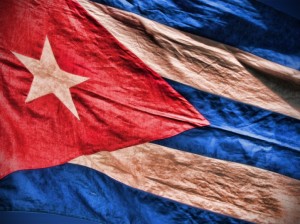 A majority of Floridians now favor thawing U.S. relations with Cuba. Will Washington follow?
A majority of Floridians now favor thawing U.S. relations with Cuba. Will Washington follow?The poll by the Atlantic Council shows that 63 percent of Floridians favor normalizing U.S. relations with Cuba—a figure that outpaces even the majority 56 percent nationwide.
Support for thawing U.S. Cuba policy was higher among Democrats and independents, at 60 percent each, but reflected a majority among Republican respondents as well. Latinos also polled significantly above the national average in favor of restoring relations with the island.
The reasons behind the Florida flip have been emerging for some time now. New generations of Cuban Americans increasingly oppose the policies that restrict travel and diplomacy, as well as the trade embargo. A Florida International University survey after the 2008 elections showed that 55 percent of Florida’s Cuban Americans wanted the embargo lifted.
Cuban Americans, who for years supported the embargo, now look to open up investment opportunities and restore family ties. In a recent interview that stirred passions in the Cuban ex-pat community, powerful sugar magnate Alfonso Fanjul told the Washington Post that it’s time to “reunite the Cuban family” and expressed his desire to invest on the island.
The U.S. business community as a whole largely opposes the embargo, with the U.S. Chamber of Commerce estimating that it costs the U.S. economy $1.2 to $3.6 billion annually. A 2013 editorial in Forbes noted this fact and called on Washington to end the embargo, stating, “A perpetual embargo on a developing nation that is moving towards reform makes little sense, especially when America’s allies are openly hostile to the embargo.”
At the presentation of the Atlantic Council poll in Washington, Senators Patrick Leahy and Jeff Flake called on their colleagues “to end this Cold War.” Leahy noted that the policy has been costly and ineffective, observing, “it has no more chance for success now than it did when it began.”
A growing number of congressional representatives, like Leahy and Flake, not only openly oppose the current U.S. Cuba policy, but have actively joined the campaign to change it. They are right to take up the cause. The embargo does not reflect the views of the majority of U.S. citizens. It hampers coordination between neighbors and arguably violates international law.
It has also had a high cost internationally, especially in U.S. relations with Latin American countries. The Organization of American States voted to readmit Cuba in 2009 over Washington’s objections. And the United Nations has voted for 21 resolutions characterizing the embargo as a violation of human rights and international law and calling on Washington to lift it. The 2013 vote saw a record 188 countries join the call to end the embargo, with only Israel supporting the U.S. government’s position. As Leahy pointed out, “Rather than isolating Cuba, we have isolated ourselves.”
These shifts have left the defense of the 53-year embargo in the hands of a few increasingly isolated congressional hard-liners, most notably New Jersey Sen. Bob Menendez, the powerful chair of the Senate Foreign Relations Committee, along with Florida Sen. Marco Rubio and Rep. Ileana Ross-Lehtinen.
These members of Congress cling to an atavistic Cold War position that is gradually dying out. Judging by the results of the polls, they do not even represent the majority views of their own constituents.
But apparently Cold Wars die hard. As warmer winds blow in the Caribbean, Washington appears locked in its blizzard cycle. This April, the AP exposed a classic, if technologically updated, Cold War intelligence program in the form of a Twitter-like social network developed by USAID “to undermine the Communist government in Cuba.”
Based on 1,000 pages of documentation, the reporters detailed a hidden program carried out by the State Department and U.S. contractors, including Denver-based Mobile Accord and Creative Associates, to build an online social network of Cuban youth that harvested the personal data of users while concealing any links to the U.S. government.
The exposé renewed debates on “regime change” and the use of USAID for political destabilization in Cuba. Government spokespersons denied that the program was “covert,” which would require written authorization, calling it “discreet” instead. A USAID spokesperson claimed that the agency did not use the personal information it collected, but the State Department announced that it would review the program—in particular some messages that indicate the agency used the platform to plant anti-Castro propaganda. The program, called ZunZuneo, grew to 68,000 users according to USAID, and was discontinued abruptly in 2012, apparently when its true origins were discovered.
U.S. taxpayers footed the reportedly $1.6-million bill for what was not only a colossal failure, but in the end an international embarrassment. The ZunZuneo scandal comes amid growing questions about the U.S. government’s use of the Internet for surveillance, spying, and planting false messages that have alienated both friends and foes.
Hardcore anti-Castro politicians will not let go of their historical grudges even under constituent pressure. But they are losing ground rapidly. As Cuba loosens its policies on foreign investment and lifts travel restrictions on its citizens, extreme positions are becoming politically untenable.
Tom Hayden adds that with Menendez weakened by a federal probe into his relations with alleged Ecuadorian embezzlers, and now with a big campaign contributor accused of massive Medicare fraud, this may finally be the opportunity for the Democrats to listen to the people and stand up to the biggest obstacle in the way of normalizing relations with Cuba: their own New Jersey senator.
Florida could be blazing a new path. With Floridians calling on the United States to bridge the 90-mile swath that separates the state from the island nation, Washington should step up to take the lead.



